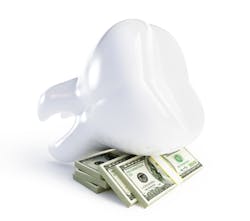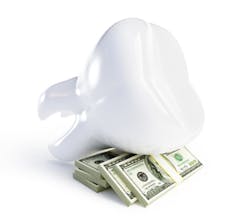Why 96% of dentists struggle to retire: Stretched too thin
From the series "Why you can't retire ... and what you can do about it!"
As a breed, dentists lead a life of control. Dentists are the ones in charge of the practice, seeing virtually every patient, or at least overseeing what happens in each operatory. Dentists spend a great deal of time at the chair being dentists, and for the most part, production depends on them.
Many dentists tend to be "at the chair" working on the wrong things. This means dentists doing their own payroll, or accounting, handling their own HR, or keeping their own books. They are "at the chair," but it’s the wrong one!
One of the reasons dentists are stretched too thin is that they assume too many roles that others could do on their behalf. It’s common for a dentist who owns a practice to handle most patient encounters, staff issues, HR problems, much of the business side of the practice, and some of the collections and scheduling.
So how does being stretched too thin impact a dentist's ability to retire?
First, the dentist who feels the need to be in control of all of these areas becomes easily distracted. Dentists produce revenue by doing dentistry. Any time the dentist is not performing dentistry, the dental office loses revenue.
Simply having more staff is not generally the answer. It is vitally important that the dental staff is placed into areas of strength and accountability. I have actually encountered dental practices where the staff refused requests for appointments on certain days because they had other plans. Take a moment to read that again.
Another impact on the dentist's ability to retire comes when dentists welcome impromptu sales calls. Many dentists have retirement and money on their mind. If a sales person happens to drop into the office and catch the dentist's attention, the dentist might see the salesperson for a few minutes. After all, the doc has been feeling the need to address retirement, so here's a chance. Right?
Maybe not. In my experience busy dentists get caught by a well-meaning sales person, pay attention for a moment, buy a financial product thinking they have "done something," and then they buckle back down until the next salesperson drops by.
After about 20 years of “doing something,” many dentists have a debris field of starts and stops, insurance and investments, and other products behind them that rivals the debris field of the Titanic. The problem is that no plan exists, and little-to-no cohesion is maintained, which creates inefficiencies that can range from annoying to financially debilitating for the dentist's retirement.
The last thing I will discuss that impacts dentists’ ability to retire comfortably is the fact that dentists work hard. I've often thought of dentists as the "blue collar-white collar" profession. Hard work is an honor, and dentistry is an honorable profession. But there comes a point when working hard reaches the point of negative returns.
Ask most Americans and they will tell you they think that dentists have it made — taking Fridays off to play golf and finishing the day around 4 p.m. The problem is that many dentists don't really finish that early, and many don't even want to! Many Fridays are spent cleaning up collections and bookkeeping.
ALSO BY WILL PARRISH:The 11 commandments of risk management for the dental professional
The 11 commandments of risk management for the dental professional Part II
What are some practical steps dentists can take to address these issues?
1. Invest in your staff — I don't mean giving raises or bonuses, although that could be a part of a future incentive program. I mean have a professional conduct personality profiles and strength/weakness tests on each staff member. That professional can then assist in placing the current staff in positions that match their strengths and weaknesses and address interpersonal issues.
2. After implementing some changes, it might make sense to offer performance and production-based bonuses — Profit sharing can be a strong motivator. Along with the incentives, it might make sense to also have very clearly defined key-performance indicators that must be met to receive the profit sharing. For example, staff could earn an extra paid day off for hitting certain production goals.
3. Be proactive in building your team of advisors — Take one day a quarter to touch base with your CPA, financial planner, and attorney. This will keep financial plans top of mind. If you do not currently have this team in place, then get referrals from other well-respected dentists in your area. You will be much happier and successful by choosing your advisors as opposed to having them chosen for you.
4. Make some time for you and your family — Book personal and family time just like you book a CE meeting or a day of surgery. The frequency and time are up to you, but this time is sacred. Besides, with that well-trained staff keeping your schedule full, you won't mind taking a day just for you.
I hope you find this advice helpful. If you have questions or need help building your team, I welcome calls from dentists across the country. I’m often able to help, or I can introduce you to other professionals who can provide assistance.
Check out my "alpha team" of dental advisors at www.southeastdentaladvisors.com, visit my company's website www.sdp-planning.com, or reach out to me at [email protected].
About the Author

Will Parrish
Will Parrish is a founding partner of Slate, Disharoon, Parrish & Associates LLC in Knoxville, Tennessee. He specializes in risk management for his clients, who tend to be business owners and professionals. Will focuses on protecting his client’s interests and assets, whether under the umbrella of a comprehensive financial plan or through the use of financial products. Feel free to contact him with questions at [email protected] or (865) 357-7373. Visit sdp-planning.com or connect with him on LinkedIn.
Updated May 2, 2018

